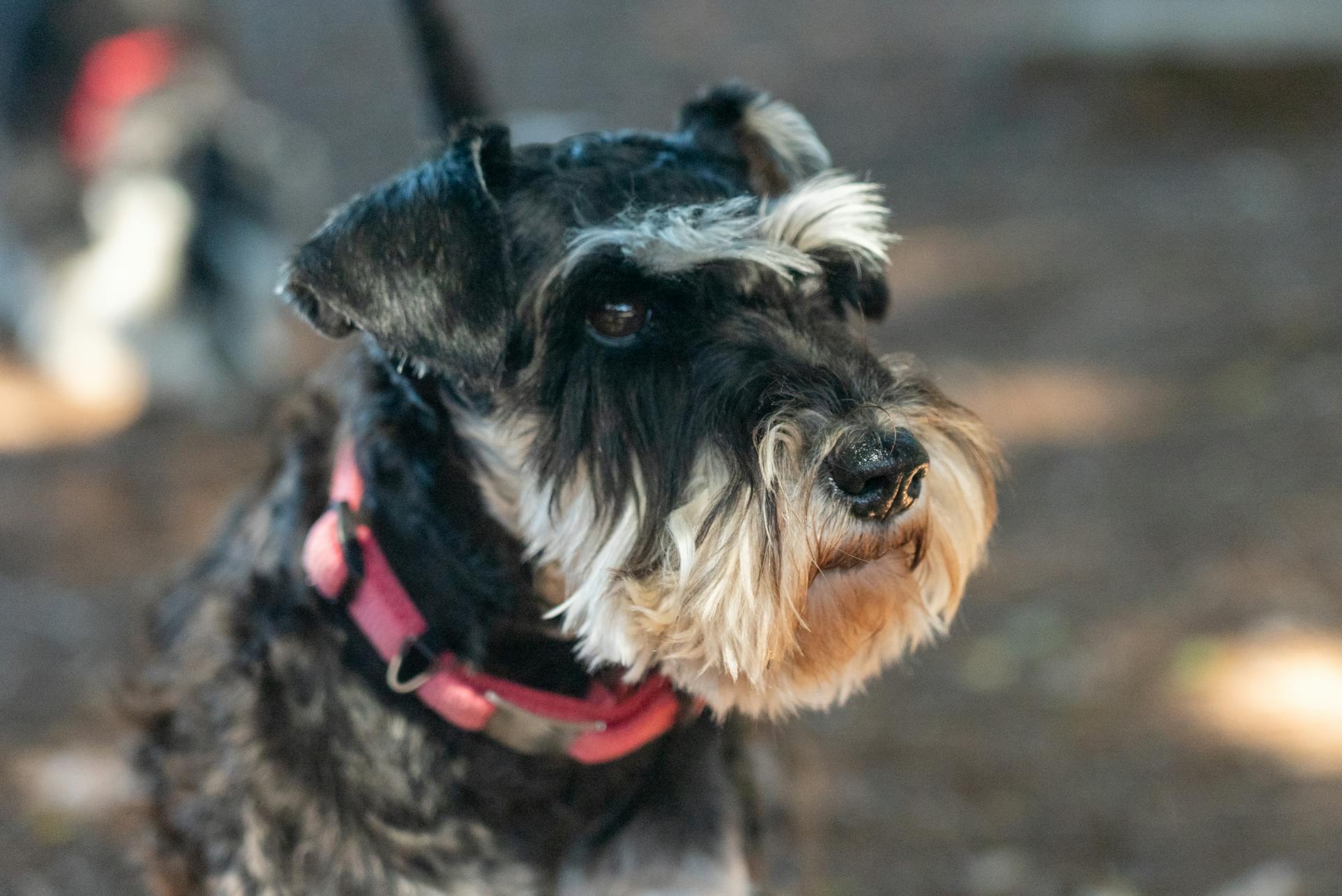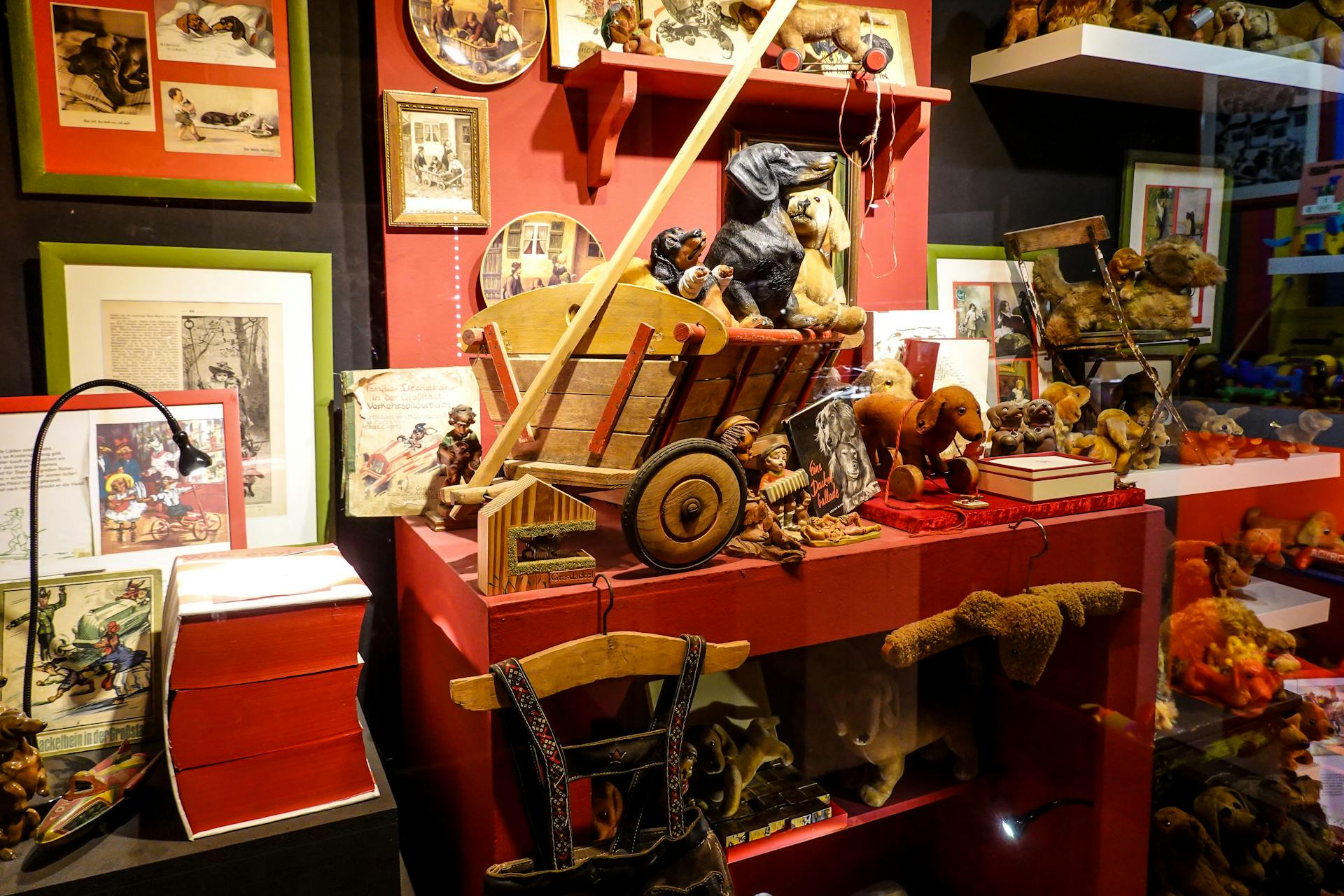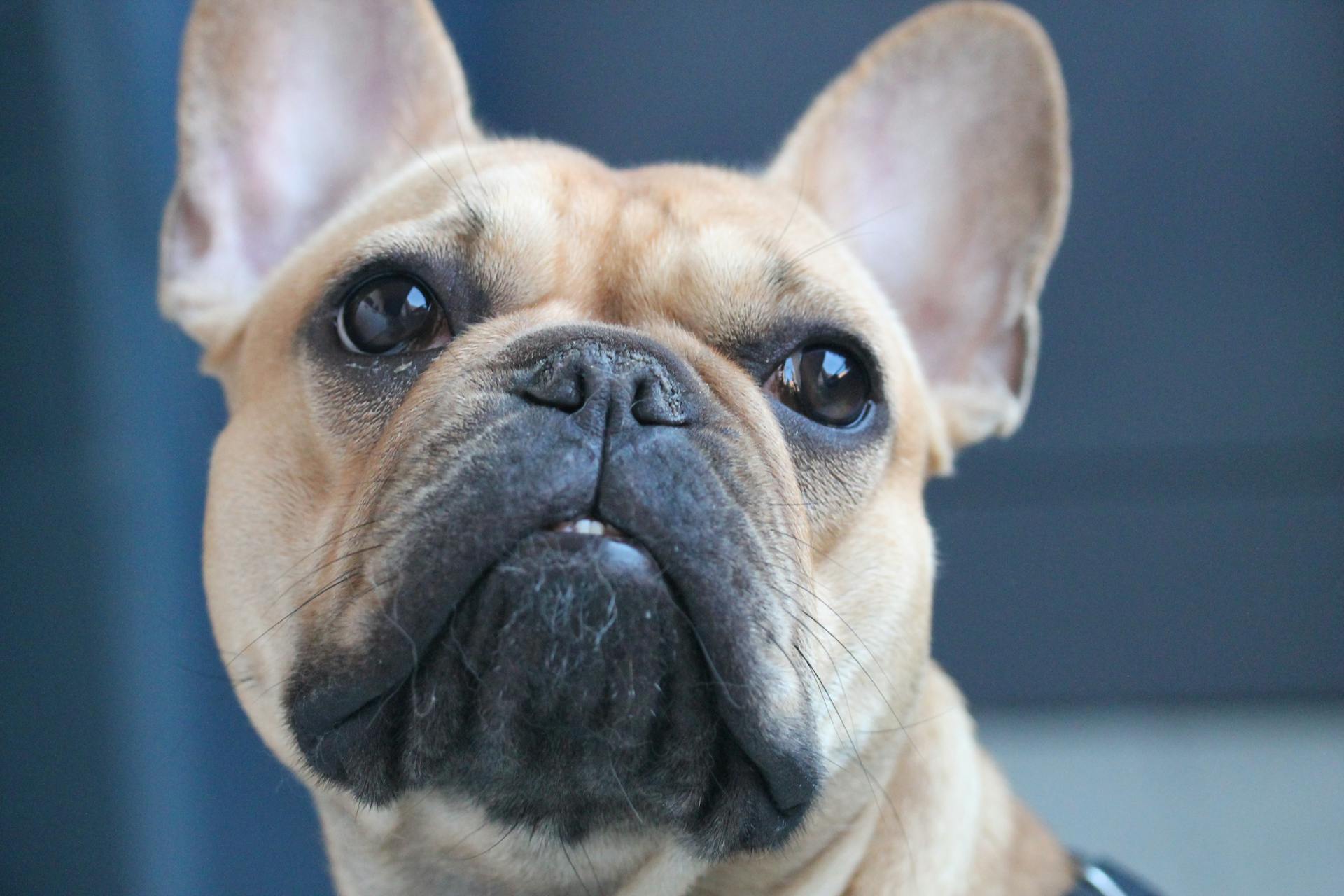
The Miniature Schnauzer is a popular breed that's perfect for many families, but it's essential to consider the pros and cons before bringing one home.
They're intelligent and trainable, but they can be stubborn at times, requiring consistent and patient training.
Miniature Schnauzers are known for their loyal and affectionate nature, making them great companions for active families.
However, their high energy levels mean they need regular exercise and mental stimulation to prevent boredom and destructive behavior.
Their hypoallergenic coat requires regular grooming to prevent matting and tangling, but it's relatively low maintenance compared to other breeds.
Miniature Schnauzers are generally healthy, but they can be prone to certain health issues, such as eye problems and patellar luxation.
Pros
Miniature Schnauzers are known for their friendly and affectionate nature, making them a great addition to any family. They are also good with kids and can get along well with them, as long as they are socialized properly from an early age.
One of the best things about Miniature Schnauzers is that they don't shed much, which can be a huge plus for people with allergies or who prefer a low-maintenance coat.
Their playful and energetic personalities make them a joy to be around, and they love to engage in interactive games with their humans. They are also great companions for families with children or active individuals who enjoy outdoor activities.
Miniature Schnauzers are intelligent dogs that are easy to train, and they are eager to please their owners. They can learn a variety of tricks and are known for being people-oriented, loving to be around their family and friends.
Here are some key pros of owning a Miniature Schnauzer:
- Friendly and affectionate
- Good with kids
- Doesn't shed much
- Intelligent and easy to train
- People-oriented and loving
Owning a Pet: Disadvantages
Miniature Schnauzers can be very vocal, which might not be ideal for apartment dwellers or those who value quiet evenings at home.
Their grooming needs are somewhat involved, requiring regular brushing and trimming to prevent matting and keep their distinctive beard and eyebrows looking their best.
High prey drive is another potential challenge, as Miniature Schnauzers are naturally inclined to chase small animals and might not get along with pets that fit the bill.
Some common characteristics of Miniature Schnauzers that might be considered downsides include:
- Can be very vocal
- Somewhat involved grooming needs
- High prey drive
Characteristics
Miniature Schnauzers are known for their bright and vigilant temperament, making them excellent watchdogs. They're wary of strangers and devoted to their family.
Their affection level is high, so be prepared for plenty of cuddles and playtime. They're also very intelligent, with a high trainability score, which means they excel in obedience training.
Here's a breakdown of their key characteristics:
Terrier Temperament
Miniature Schnauzers are terriers at heart, and that means they can be quite feisty and independent. Their intelligence and playfulness are appealing qualities, but their terrier instincts can sometimes lead to stubborn behavior and a strong-willed personality.
Training a Miniature Schnauzer requires patience, consistency, and a firm hand to ensure they respect you as their leader. They're not the best match for inexperienced dog owners, as their terrier nature can make them challenging to train and handle.
Their terrier instincts can sometimes lead to stubborn behavior and a strong-willed personality. This means they may require more time and effort to train, but with the right approach, they can learn to obey commands and behave well.
Suggestion: Giant Schnauzer Traits
Miniature Schnauzers are generally semi-open to meeting strangers and other dogs, but their prey drive may not coexist peacefully with smaller household pets like rodents. Early socialization is essential to ensure they grow up to be well-rounded dogs.
Here are some key characteristics of the terrier temperament in Miniature Schnauzers:
Overall, Miniature Schnauzers are loyal and affectionate companions that thrive on being by your side. With patience, consistency, and positive reinforcement, you can train them to be well-behaved and obedient.
Low Shedding Coat
If you're someone who dislikes dealing with pet hair all over your home, a Miniature Schnauzer's coat may be a huge plus for you. They have a double coat with a wiry outer layer that sheds minimally compared to other breeds.
Their low-shedding coat also means they are hypoallergenic, making them a great choice for individuals with allergies to pet dander.
Miniature Schnauzers require regular grooming to keep their coat looking its best. This includes brushing the coat daily and hand-stripping it every 4-6 weeks to remove the dead hair and keep it healthy.
Here are some key facts about the coat of a Miniature Schnauzer:
- Double coat with a wiry outer layer
- Sheds minimally compared to other breeds
- Hypoallergenic, making them a great choice for individuals with allergies to pet dander
- Requires regular grooming, including daily brushing and hand-stripping every 4-6 weeks
Exercise Needs
Miniature Schnauzers are high-energy dogs that require regular exercise to stay happy and healthy. They need at least one hour of physical activity and mental stimulation every day.
If you're not able to provide enough exercise, your Miniature Schnauzer may become bored and develop destructive behaviors like excessive barking or chewing. This can be a real challenge for owners who don't have the time or energy to keep up with their dog's needs.
Daily walks, playtime, and interactive games are essential to meet your Miniature Schnauzer's exercise requirements. These activities can be as simple as a walk around the block or a game of fetch in the backyard.
Here are some examples of exercise activities that are suitable for Miniature Schnauzers:
- Walks
- Jogs
- Running freely in a secure area
- Fetch
- Dog sports
- Obedience
- Rally
- Flyball
- Barn hunt
- Agility
- Lure coursing
Remember to always keep your Miniature Schnauzer on a leash or in a fenced area when exercising outdoors, as their strong prey drive can cause them to quickly take off after perceived quarry.
Daily Care and Habits
A miniature schnauzer needs a moderate amount of exercise each day, which means at least 45 minutes of daily exercise to keep them happy and healthy.
To prevent accidents in the house, crate training is a kind and effective way to ensure your schnauzer doesn't get into things they shouldn't. A crate is also a great place for them to retreat for a nap.
Miniature schnauzers are smart dogs that require mental stimulation, which can be provided with puzzle toys. They also love to play with toys and follow you from room to room, making them active companions.
To keep your miniature schnauzer's coat looking its best, brush it at least weekly, and consider professional grooming twice a year. Regular brushing will also help prevent matting and keep their coat tidy.
A quick daily brushing will remove any loose fur and prevent tangles, and you'll also want to clean and brush out their beard, which may collect food and dirt.
For another approach, see: Schnauzer Brush
Here's a quick rundown of daily grooming tasks:
- Brush their coat at least weekly
- Brush their teeth at least three times a week
- Clean their ears weekly
- Trim their nails about every month
- Give them a bath roughly every month
By following these daily care and habits, you'll be well on your way to raising a happy, healthy, and well-groomed miniature schnauzer.
Health
Miniature Schnauzers are generally healthy, but like all breeds, they're prone to certain health conditions. Cataracts are a common issue, causing opacity on the lens of the eye and resulting in poor vision.
Regular veterinary check-ups and a proper diet can help prevent and manage these health concerns. Pancreatitis, a condition that causes inflammation of the pancreas, is another issue that can be triggered by high-fat diets.
Miniature Schnauzers may also develop urinary stones, which can cause discomfort and urinary tract issues. Eye problems such as progressive retinal atrophy (PRA) are also prevalent in this breed and can lead to vision impairment or blindness if left untreated.
Some common health concerns in Miniature Schnauzers include skin allergies, pancreatitis, and bladder stones. To mitigate these health concerns, regular veterinary checkups, a balanced diet, and proper grooming are essential.
Here are some common health issues in Miniature Schnauzers:
- Cataracts
- Pancreatitis
- Urinary stones
- Progressive retinal atrophy (PRA)
- Hyperlipidemia
Illness/Health Concerns

Miniature Schnauzers are generally a healthy breed, but like all breeds, they're prone to certain health conditions. Some common health concerns include skin allergies, pancreatitis, and bladder stones.
Pancreatitis is a condition that causes inflammation of the pancreas and can be triggered by high-fat diets. It's a painful condition that can be life-threatening if left untreated.
Regular veterinary check-ups and a proper diet can help prevent and manage these health concerns. For example, dietary changes can help manage skin allergies, and a balanced diet can reduce the risk of pancreatitis.
Miniature Schnauzers are also at risk for eye problems such as cataracts, progressive retinal atrophy (PRA), and entropion. Cataracts cause opacity on the lens of the eye, resulting in poor vision, while PRA involves the gradual deterioration of the retina.
Here are some common health issues seen in Miniature Schnauzers:
- Pancreatitis
- Bladder stones
- Cataracts
- Progressive retinal atrophy (PRA)
- Entropion
- Urinary stones
- Myotonia Congenita
- Von Willebrand’s Disease
- Congenital Megaesophagus
It's essential to be aware of these health concerns and work with your veterinarian to develop a preventive health plan to watch for and hopefully prevent some predictable risks.
Diet and Nutrition
Miniature schnauzers need fresh water available at all times.
They thrive on high-quality, nutritionally balanced canine diets.
It's common to feed two measured meals per day.
You should discuss the amount and type of diet with your vet to ensure you're meeting your dog's needs.
Be mindful of treats and other extra food to prevent overeating.
Some miniature schnauzers may need a special diet to manage high fat levels, which should always be prescribed by a veterinarian.
Broaden your view: Miniature Schnauzer Diet
Spay or Neuter
Spaying or neutering your Mini Schnauzer is a crucial decision to make. It decreases the likelihood of certain types of cancers. Spaying or neutering eliminates the possibility of your pet becoming pregnant or fathering unwanted puppies.
Spaying or neutering also gives us a chance to identify and address some diseases your dog is likely to develop. This can be done while your pet is under anesthesia, making it more convenient for you and easier on your friend too. Routine blood testing prior to surgery helps us identify and take precautions against common problems that increase anesthetic or surgical risk.
Discover more: How to Identify a Shih Tzu
Lifespan
Miniature Schnauzers have a lifespan of around 12 to 15 years. This means you can expect a long and happy life with your furry friend, but it's essential to prioritize their health and well-being to ensure they reach their full potential.
Regular veterinary check-ups can help identify any potential health issues early on, allowing for prompt treatment and prevention of more serious problems.
Ownership
The miniature schnauzer is a popular breed, but one thing to consider is ownership. They are a relatively small dog, but they still require regular grooming to prevent matting and tangling of their distinctive beards and eyebrows.
Miniature schnauzers are known for being loyal and protective of their families, but this can sometimes manifest as suspiciousness around strangers. They make great watchdogs, but this also means they may not be the best fit for everyone.
As a companion dog, miniature schnauzers thrive on interaction and attention from their owners, so they're best suited for families or individuals who can provide them with plenty of love and attention.
Expand your knowledge: Best Homemade Food for Miniature Schnauzer
The Benefits of Ownership
Miniature Schnauzers are huge personalities in small packages that bring immense joy to their owners.
Their playful nature is just one of the many reasons why they're beloved by many.
They're loyal companions that will reward you with a watchful eye and affectionate companionship if you treat them right.
Having a Miniature Schnauzer as part of your family can bring a lot of happiness and companionship to your life.
Their loyalty is unmatched, and they'll be by your side every step of the way.
They're perfect for families or individuals who want a low-maintenance but high-reward pet.
Adopt or Buy
If you're looking to bring a Miniature Schnauzer into your life, you have two main options: adopting or buying.
The cost of buying a puppy from a reputable breeder can vary, but you can expect to pay anywhere from $500 to $2,800 on average.
You might be surprised to find that local animal shelters and breed-specific rescue groups often have Miniature Schnauzers waiting for a forever home.
Related reading: Buying a Schnauzer Puppy
For those who want to buy from a breeder, checking out the American Miniature Schnauzer Club and the American Kennel Club Marketplace can be a good place to start.
If you're looking for a more affordable option, or if you're drawn to the idea of giving a loving home to a dog in need, consider checking local animal shelters and breed-specific rescue groups.
Here are some resources to help you find a Miniature Schnauzer:
- American Miniature Schnauzer Club
- American Miniature Schnauzer Club Rescue Program
- American Kennel Club Marketplace
Frequently Asked Questions
What are the behavior problems with Mini Schnauzers?
Miniature Schnauzers can exhibit destructive behavior, vocalization, and escape attempts due to separation anxiety and excessive barking. Understanding these behavior problems can help you provide a happy and healthy home for your Miniature Schnauzer
Are Schnauzers high maintenance?
Schnauzers require regular grooming to prevent matting and tangling, but their needs can be managed with regular sessions every 6 weeks. With the right care, Schnauzers can be a relatively low-maintenance breed.
Are Schnauzers good house dogs?
Yes, Miniature Schnauzers make great house dogs due to their friendly and adaptable nature. They thrive in homes with families and are well-suited for apartment living.
Sources
- https://schnauzerfun.com/the-pros-and-cons-of-owning-a-miniature-schnauzer/
- https://www.thesprucepets.com/miniature-schnauzer-dog-breed-profile-1117982
- https://dogtime.com/dog-breeds/miniature-schnauzer
- https://www.advancedanimalcare.com/services/dogs/breeds/miniature-schnauzer
- https://figopetinsurance.com/blog/miniature-schnauzers-breed-guide
Featured Images: pexels.com


